| Srl | Item |
| 1 |
ID:
109798
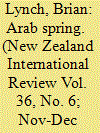

|
|
|
| 2 |
ID:
086289
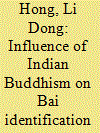

|
|
|
|
|
| Publication |
2009.
|
| Summary/Abstract |
Exactly when Buddhism spread to the Lake Erhai region continues to be a hotly debated issue among scholars. Upon examining currently available documents and artifacts, however, one starts to see evidence that Indian Buddhism spread to the Lake Erhai region of western Yunnan from the 'Southern Branch of the Silk Road' by about the middle of the seventh century ad.Indian Buddhism has had a profound impact on Bai history and culture, most notably in (1) the spread and assimilation of Acaya Buddhism into Bai culture, and (2) the Bai perception that they are the descendents of King Asoka, India's famous early promoter of Buddhism.
|
|
|
|
|
|
|
|
|
|
|
|
|
|
|
|
| 3 |
ID:
083576


|
|
|
|
|
| Publication |
2008.
|
| Summary/Abstract |
The traditional understanding of the origins of international relations (IR) is on the ropes. The old vision of a discipline that was born under an idealist star and matured through a first 'Great Debate' is no longer credible. This article offers an alternative understanding: viz. that a scholarly study of IR emerged during the decades prior to World War I, that the emergence represents an international movement, and that it was occasioned by major changes in Great Power economic and political affairs. By posing a few simple questions - who were the first scholarly IR-authors? where and why they write? - this article identifies some of the formative forces that produced the first (now largely lost) generation of IR scholars. It proposes a historically grounded, alternative to our traditional (largely British and mythological) understanding of early IR scholarship
|
|
|
|
|
|
|
|
|
|
|
|
|
|
|
|
| 4 |
ID:
152988
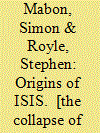

|
|
|
|
|
| Publication |
London, I B Tauris, 2017.
|
| Description |
xiv, 232p.: ill.pbk
|
| Standard Number |
9781784536961
|
|
|
|
|
|
|
|
|
|
|
|
Copies: C:1/I:0,R:0,Q:0
Circulation
| Accession# | Call# | Current Location | Status | Policy | Location |
| 059070 | 363.325/MAB 059070 | Main | On Shelf | General | |
|
|
|
|
| 5 |
ID:
077877
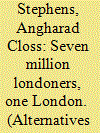

|
|
|
|
|
| Publication |
2007.
|
| Summary/Abstract |
This article explores the different ideas of community circulating in the aftermath of the 7 July 2005 bombings in London. Specifically, it compares the idea of a community in unity with a more cosmopolitan, urban idea of community. While these two ideas seem to present sharply different responses, the article questions the extent to which the cosmopolitan model offers an alternative to the nationalist idea of community. Drawing on various discussions about how ideas of community are produced through different understandings of time and origins, the article argues that in this specific case both the national and the cosmopolitan accounts of community worked according to a very similar logic, and therefore risked reproducing similar problems and exclusions. Consequently, the article suggests that the task of exploring alternative conceptions of community must involve greater sensitivity to the politics of time and other approaches to the politics of origins. This challenge is pursued through the motif of the city as a site expressing a different temporality and thus a different idea of community from that expressed in traditions of national belonging.
|
|
|
|
|
|
|
|
|
|
|
|
|
|
|
|
| 6 |
ID:
157784
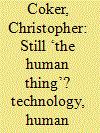

|
|
|
|
|
| Summary/Abstract |
Is war beginning to escape human control? Thucydides tells us the war is one of the things that makes us definitively human; but how long will this continue to be the case as our relationship with technology continues to develop? Kenneth Waltz’s book Man, the State and War affords one way of answering that question. So too does Nikolaas Tinbergen’s framework for understanding human behaviour and Bruno Latour’s Actor–Network Theory (ANT). The main focus of this article is the extent to which we will diminish or enhance our own agency as human beings, especially when we come to share the planet with an intelligence higher than our own.
|
|
|
|
|
|
|
|
|
|
|
|
|
|
|
|